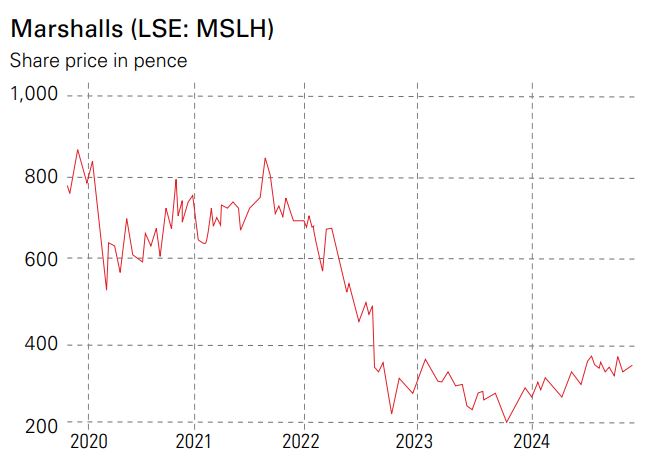Is now the time to buy Marshalls?
Former market darling Marshalls, a landscaping and building products supplier, looks too cheap. Is it time to buy this once-admired stock?

Get the latest financial news, insights and expert analysis from our award-winning MoneyWeek team, to help you understand what really matters when it comes to your finances.
You are now subscribed
Your newsletter sign-up was successful
Want to add more newsletters?

Twice daily
MoneyWeek
Get the latest financial news, insights and expert analysis from our award-winning MoneyWeek team, to help you understand what really matters when it comes to your finances.

Four times a week
Look After My Bills
Sign up to our free money-saving newsletter, filled with the latest news and expert advice to help you find the best tips and deals for managing your bills. Start saving today!
Sometimes certain firms become stock market darlings. They generate outstanding and consistent returns for shareholders and are widely owned by professional investors. Often shares in these companies are at their riskiest when they are most popular, as prices become untethered from value. When things go awry, the share-price decline can be extreme but, after the fall, a great investment opportunity can emerge. One such former darling is Marshalls (LSE: MSLH), which was loved by numerous investors. It rewarded that love with a peak-to-trough decline of 80% in two years. Having been patently overvalued at their peak, the shares now look cheap. Might now be the time to buy this once-admired stock?
Marshalls produces and supplies landscaping, building and roofing products; it makes things like paving stones, concrete blocks and the various layers that go into constructing pitched roofs. These things may seem unglamorous in a world of AI and robotics stocks but Marshalls is an example of the kind of business that does seemingly simple things very well. From businesses that produce simple products well, great investment returns can be enjoyed. A £10,000 investment in the shares with dividends reinvested for the 25 years to September 2021 would have been worth £260,000.
What went wrong for Marshalls?
However, since the shares peaked at just over 840p in September 2021, the return has been miserable, with the stock now at 350p. The company benefits from a strong construction market and suffers when construction is challenged. Following the global financial crisis in 2008, the cost of debt has been extremely low. This motivated a seemingly relentless boom in construction activity because property investors could finance projects very cheaply. This backdrop was the driver of Marshalls’ booming business and status as a market darling, with a lofty valuation to match. In 2022, inflation spiked. The proximate cause was increased conflict in the world, reducing the availability of raw materials and obstructing supply chains.
MoneyWeek
Subscribe to MoneyWeek today and get your first six magazine issues absolutely FREE

Sign up to Money Morning
Don't miss the latest investment and personal finances news, market analysis, plus money-saving tips with our free twice-daily newsletter
Don't miss the latest investment and personal finances news, market analysis, plus money-saving tips with our free twice-daily newsletter
Central banks raised interest rates. Suddenly, having binged on cheap debt, property investors had to withdraw from new investments. The knock-on effect was that demand for products produced by Marshalls declined. In reality, this was a marginal reduction in demand rather than an abrupt collapse. But firms such as Marshalls, with high fixed-cost bases, suffer outsized hits to profits when a marginal reduction occurs. Overall, revenues for the business have declined 15%, but profits have halved. One might therefore conclude that the low share price is, in fact, justified.

Are good days ahead for Marshalls?
The cycle is turning, with large-scale building projects underway, while there is also political momentum behind greater construction activity. Marshalls sells most of its products in the UK and will therefore benefit from this. A third of Marshalls’ sales come from commercial, infrastructure and industrial production, where construction has already begun on a large number of projects. Around a quarter of the business sells to the housing repair, maintenance and improvement subsectors. Some activity here has been delayed, but expenditure is inevitable. In fact, the delay will have to be made up for by extra sales in the future, placing upward pressure on demand.
The largest part of the business deals with new-builds in the housebuilding sector. Demand in this market has been subdued recently because of higher interest rates placing upward pressure on mortgage rates. However, not all houses are built for owner-occupiers and we might be about to see a renaissance in the building of social housing. Thus, lofty though it might appear, should the government’s target of 300,000 homes per annum be met, there will have to be record levels, of demand for the products that Marshalls delivers. The result is that, far from being a fallen angel, Marshalls is a company whose best days may lie ahead of it.
Should you buy Marshalls?
Marshalls’ shares spent much of the decade before the 2021 peak trading at a price/earnings (p/e) ratio of more than 20, sometimes approaching 30 – a level that would be deemed expensive by most investors. Today, the p/e is once again around 20. However, the environment for construction means that the company may be under-earning by as much as half. In other words, should there be a return to strong construction markets, particularly in housebuilding, then the earnings for the business could easily double or more, and the p/e would fall to around 10. Compared with its history, this would be a remarkably cheap p/e and thus the shares could perform very well.
On its website, Marshalls boasts that its products can be found at every location on the Monopoly board: wherever there is building work occurring in the UK, Marshalls’ products won’t be far away. Indeed, it is likely that almost everyone, unknowingly, interacts with Marshalls’ products every day of their lives. Ultimately, Marshalls is a well-run business, where the quality of its operations is temporarily obscured by the UK construction backdrop. This backdrop will improve and when it does, Marshalls will be a major beneficiary. It may never become a stock market darling again, but when it is as uncommonly cheap as today, it doesn’t need to be for it to make a great investment.
This article was first published in MoneyWeek's magazine. Enjoy exclusive early access to news, opinion and analysis from our team of financial experts with a MoneyWeek subscription.
Get the latest financial news, insights and expert analysis from our award-winning MoneyWeek team, to help you understand what really matters when it comes to your finances.
Jamie is an analyst and former fund manager. He writes about companies for MoneyWeek and consults on investments to professional investors.
-
 Early signs of the AI apocalypse?
Early signs of the AI apocalypse?Uncertainty is rife as investors question what the impact of AI will be.
-
 Reach for the stars to boost Britain's space industry
Reach for the stars to boost Britain's space industryopinion We can’t afford to neglect Britain's space industry. Unfortunately, the government is taking completely the wrong approach, says Matthew Lynn
-
 Early signs of the AI apocalypse?
Early signs of the AI apocalypse?Uncertainty is rife as investors question what the impact of AI will be.
-
 8 of the best properties for sale with beautiful kitchens
8 of the best properties for sale with beautiful kitchensThe best properties for sale with beautiful kitchens – from a Modernist house moments from the River Thames in Chiswick, to a 19th-century Italian house in Florence
-
 Three key winners from the AI boom and beyond
Three key winners from the AI boom and beyondJames Harries of the Trojan Global Income Fund picks three promising stocks that transcend the hype of the AI boom
-
 RTX Corporation is a strong player in a growth market
RTX Corporation is a strong player in a growth marketRTX Corporation’s order backlog means investors can look forward to years of rising profits
-
 Profit from MSCI – the backbone of finance
Profit from MSCI – the backbone of financeAs an index provider, MSCI is a key part of the global financial system. Its shares look cheap
-
 'AI is the real deal – it will change our world in more ways than we can imagine'
'AI is the real deal – it will change our world in more ways than we can imagine'Interview Rob Arnott of Research Affiliates talks to Andrew Van Sickle about the AI bubble, the impact of tariffs on inflation and the outlook for gold and China
-
 Should investors join the rush for venture-capital trusts?
Should investors join the rush for venture-capital trusts?Opinion Investors hoping to buy into venture-capital trusts before the end of the tax year may need to move quickly, says David Prosser
-
 Food and drinks giants seek an image makeover – here's what they're doing
Food and drinks giants seek an image makeover – here's what they're doingThe global food and drink industry is having to change pace to retain its famous appeal for defensive investors. Who will be the winners?